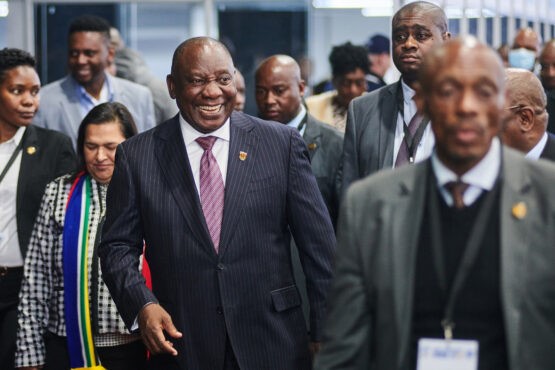President Cyril Ramaphosa appears to be pleased with himself. The country’s new 10-party unity government is forging closer ties with the business community, with positive spin-offs for the country at large. Speaking at a lobby group known as Business Unity South Africa’s annual general meeting between government and business the President said in a speech in Johannesburg on Wednesday. “The deepening of the relationship between government and business is essential to the growth of our economy, our relationship is far too important to fail.”
The president’s comments underscore the far more business-friendly stance the authorities have adopted since the African National Congress lost its parliamentary majority in May 29 elections for the first time since it took power three decades ago and a so-called government of national unity was formed to run the country. Its members, which include the main opposition Democratic Alliance, have identified economic growth as a top priority, with a view toward tackling a 34% unemployment rate. The new administration is working well and has been able to achieve broad consensus on the most pressing issues facing the country, according to Ramaphosa. It’s made significant progress in tackling key challenges, including energy constraints, logistics snarl-ups, and high levels of crime and corruption, he said.
It should not come as a surprise that President Ramaphosa being a former businessman knows how to appeal to that community. He is aware of the importance of excellent leadership and its role at the helm of both business, politics and government. The DA under John Steenhuisen is also very pro-business and it remains to be seen if both the ANC and the DA can work together with business. To grow the economy and improve employment opportunities long scared by the onslaught of covid and state capture all the office holders in the GNU know they have to communicate with the business interests both major and minor. Trade and manufacturing are the major pillars of any growing economy. The GNU will have to pull up its sleeves alongside business because it will become dirty (challenging).
Headway has also been made in instituting the measures needed for South Africa to be removed from a global watchdog’s dirty-money monitoring list, the president said. The country was placed on the so-called gray list by the Financial Action Task Force in February 2023 because of shortcomings in how it tackles illicit financial flows and combats terror funding. “We will continue on the path of structural and regulatory reform to improve the business operating environment,” Ramaphosa said. “We are committed to a stable policy environment that stimulates investment.”
The President is going to have to reign in dissent both within and without if he wants to achieve his goals. The removal of South Africa from the Financial Action Task force’s grey list shows the country is on the right track concerning ending illicit cash flows and other types of illegal funding. The new adaptations to the country’s finances will help restore the nation’s confidence in the business environment by the investors. Both foreign and local. Ramaphosa is going to need the cooperation of the private sector (large corporations and small business), the public services and government departments to push through with those reforms.
The president is also taking a tougher stand against the mafia (organized crime) in the Western Cape.
Ramaphosa was delivering his keynote address on Friday after the national government, the Western Cape government and the City of Cape Town signed a deal to boost the number of police officers to curb crime in the province. He said it was a “very historic moment where we are taking decisive action to combat crime here in Cape Town, which has become the capital city of criminality, gang violence, murder and other related criminal activities, including drug peddling and abuse. “Our people have had enough of criminals terrorising communities and, by signing this cooperative agreement, we say enough is enough. “Die mense van Kaapstad is moeg van gangsters” [the people of Cape Town are tired of gangsters]. “What this means is that we are taking a war against the construction mafia, against gangsters, we are going to take you on and make sure you are brought to justice. Gangsters are tearing communities apart.”
It is interesting that the president agreed to make an agreement between his GNU, the DA run provincial government of the Western Cape, and the Cape Town Metro also run by the DA. This may not have happened without the formation of the GNU between the DA and ANC. The recent agreement to combat crime in the Western Cape with more police is a good move that should be replicated in the other eight provinces. It is surprising that Cape Town under the DA run leadership has become such a notorious centre for crime. What has the DA done to rectify the havoc wrought by criminal gangs in the Western Cape? What will partnering with the GNU of Ramaphosa change? Yes, the president is right to state that the people of the Western Cape are tired of crime, but why is the response now?
Perhaps crime in a major port like Cape Town has become worse since the government had to tackle the Covid Crisis. What ever the change in mindset the President and his coalition partners will recognize that crime is bad for business. There could still be hope ahead.
Article written by:
Yacoob Cassim
Journalist at Radio Al Ansaar






